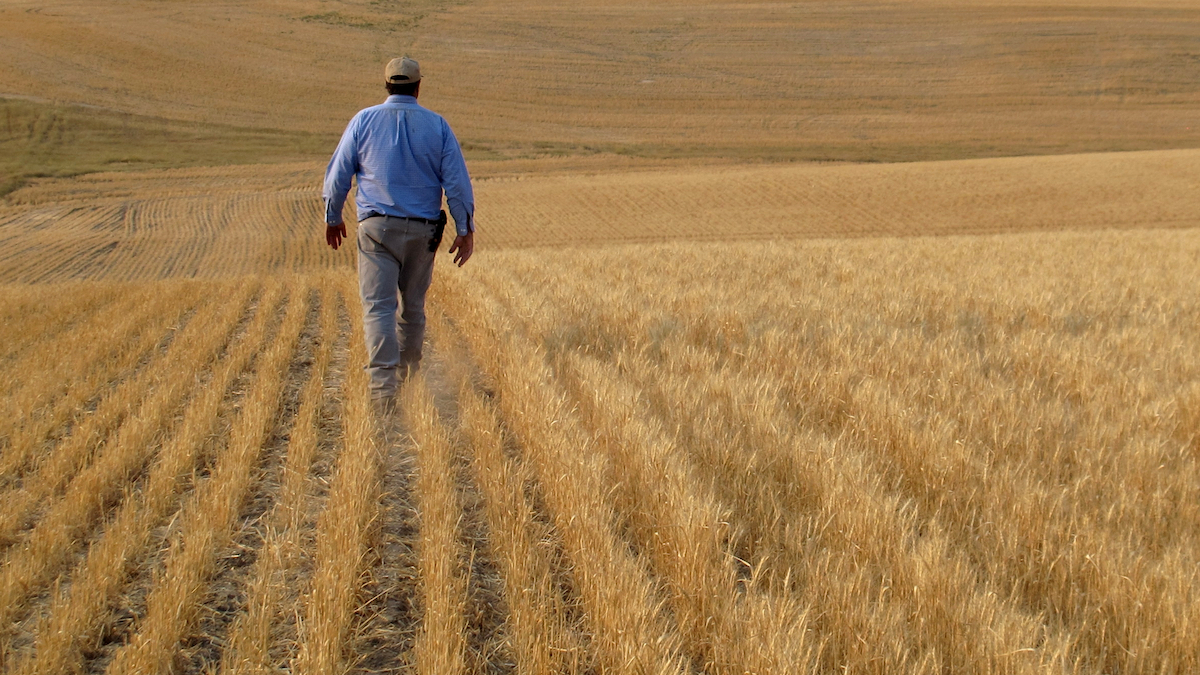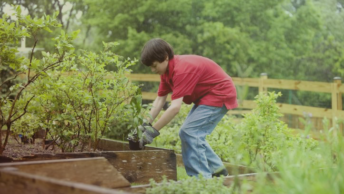I grew up on a farm, and so the Gospel verses from Matthew (13:1-23) about a farmer sowing seed brings back certain memories and reflections. My father, his three brothers, and one of his brothers-in-law, were all farmers in southeast Michigan, and whenever we had family get-togethers the men invariably discussed such things as the current price per bushel for corn as opposed to wheat, what the farmers in the next county over were planting, and whether the year was likely to have too much rain or not enough. I myself was too young to really understand what was being said, but I did have a few experiences of farm work, such as driving the tractor, baling hay, and picking corn—just enough to convince me that I wasn’t cut out for spending my life that way.
Even after my father died when I was twelve, I continued learning a little bit more about farming. I took several agriculture classes in the local public high school, learning for instance that if the soil’s acidity is too high, adding 300 pounds of lime per acre will raise its pH level, and also that the three numbers printed on a bag of fertilizer (such as 12-12-12) stand for its percentage of nitrogen, phosphorus, and potassium. I learned that crop rotation, or planting a field with a different crop each year, helps replace lost nutrients, and that letting a field lie fallow, or unplanted, every few years allows it to rest and renew itself.
I have to admit that I’ve forgotten most of what I learned about farming, and I’ve certainly never used that knowledge, but these ideas do come to mind in light of this Gospel passage. Just as there are certain things farmers can do to get the most out of their fields, so there are things we can do to make ourselves more receptive to God’s word. A farm is only as good as its soil, and there are limits to how much a farmer can improve it—but if we rely on God’s grace, that’s not true of us. Jesus offers us the message of salvation and the chance to bring forth a rich harvest; by our openness to His word, we decide how much good soil our lives will have.
We normally think of the different types of soil mentioned in Our Lord’s parable as being different kinds of people—but another way of looking at it is to recognize that all these types of soil are present in us. None of us so perfectly accepts and practices God’s word that we can claim to be totally good soil; all of us have some areas of our lives or personalities that are analogous to footpaths, rocky ground, and thorns, in addition to our good soil. Jesus said that the footpaths represent those who don’t take the time to hear God’s word, and so the seed that’s sown there is wasted. Sometimes we might be too busy for God and for others; if so, our faith doesn’t get a chance to take root. The rocky ground stands for faith which has no depth. Perhaps there are times when we’re unwilling to make sacrifices for our faith, or to do anything beyond the minimum, even though we’re otherwise basically good people. If so, our spiritual harvest will be disappointing. The thorns Jesus refers to stand for worldly values and concerns—and even for Christians it’s easy to let these take priority over our commitment to Christ; if we allow this to happen to us, and do nothing to change it, our faith will grow steadily weaker. We are good people, and there’s certainly good soil within us, but it might not be enough—so we have to increase it with God’s help. The Book of the Prophet Isaiah (55:10-11) assures us that God’s word is living and active; it will have a wonderful effect in our lives, if only we cooperate.
What does this mean—how can we receive and nourish or fertilize God’s word, so as to increase our spiritual harvest? First of all, we have to cultivate the footpaths in our lives by taking time for God. This means spending time in prayer every day, even if only a few minutes. It also means truly participating in the Mass and trying to be open to God’s word, rather than worrying about how long the Mass will take, or thinking about other things we’re going to do that day, or leaving Mass early. Secondly, we have to clear away the rocky ground in our lives by deepening our relationship with Christ. This means reminding ourselves that Jesus suffered for us, and that it’s possible we may be asked to suffer for Him (though to a much lesser extent). We should pray for God’s help, that we’ll always have the courage and commitment to be true Christians, regardless of the cost, and we should also form the habit of offering up all our sufferings and burdens as a prayer or sacrifice. Thirdly, we have to prune or weed out the thorns in our lives by choosing and following proper priorities. This means reminding ourselves that all our material possessions will be useless to us on the day of judgment, and that true wealth lies in our love for God and our neighbor. We must clear away the thorns by admitting our sins and asking for God’s grace to overcome them—especially any area of weakness or habitual sin. We’re also meant to thank God for His blessings, and to ask for His help so that we may be generous in sharing them.
In a spiritual sense, each of us is a farmer, and we’re called to cultivate and even expand the good soil we have within us. We’ll have our occasional failures and lean years, and at times we’ll wonder what the future holds and whether we’re making any real progress. However, the Gospel is very clear on one point: when our honest efforts are combined with God’s grace, the harvest will be superabundant.








